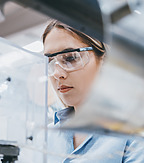Artikel | 14 maj 2020
Patent rights during the COVID-19 pandemic: a new dawn for compulsory licences and further limitations?

The COVID-19 pandemic has already resulted in unprecedented measures and responses for the protection of public health. Recent reporting on research into treatment and vaccine candidates, as well as huge worldwide demand for protective gear and healthcare products, has intensified initiatives and discussions regarding whether patent rights should be subject to further limitations in the interest of public health. Setterwalls reports on current developments concerning compulsory licences, initiatives to increase access to patent-protected inventions and the Swedish system of compulsory licences.
While the COVID-19 pandemic has brought many industries to a standstill, the life sciences industry is facing intensive development. Recent months have seen regular news reports on research projects into new vaccines or treatment candidates against COVID-19, major clinical studies, as well as large- and small-scale funding initiatives. While approved treatments and vaccines might be some way off, Covid-19 has also triggered an immediate and unprecedented demand for personal protection equipment and other medical devices needed on the healthcare frontline.
At the same time, the life sciences industry has been facing enormous challenges on the supply side due to closed borders, lockdown measures and staffing shortages. Disruptions to production and global supply chains have initiated discussions on whether the demand for necessary pharmaceuticals and medical devices will exceed the supply capacity of the patent rights holders.
This goes to the heart of the delicate balance of the patent system. Rewarding life sciences inventors and investors with exclusive patent rights has resulted in decades of win-win scenarios with remarkable technical achievements made available to the public. On the other hand, doubts have recently been aired as to whether a patent system that puts the supply of critical products in the hands of a limited number of companies warrants temporary changes in these times of extraordinary disruption. What if the rights holders to the first COVID-19-treatments are unable to keep up with demand?
Such considerations have resulted in several initiatives on the redistribution of healthcare products and compulsory licence measures regarding patents for products and processes that could be used to combat the pandemic.
Costa Rica has brought forward a proposal on how to support countries suffering from underdeveloped healthcare infrastructure in their fight against COVID-19. The proposal is to create a pool of rights relating to tests, medicines and vaccines, which are to be offered free or licensed on reasonable and affordable terms to all countries. The initiative has gained attention and support, including from the director general of the WHO, Tedros Adhanom Ghebreyesus.
In Japan, a number of high-profile tech and healthcare groups have pledged not to enforce their intellectual property rights against any activities aimed at stopping the spread of COVID-19, including diagnosis, prevention, containment and treatment. Similar pledges have also been made by companies in other countries. For example, Gilead, the developer of one the treatment candidates remdesivir, has signed non-exclusive license agreement with five generic pharmaceutical manufacturers. The agreements permits the licensees to manufacture and sell remdesivir in 127 countries. Gilead has stated that the licenses are royalty-free until the WHO declares the end of the pandemic, or until a pharmaceutical product other than remdesivir or a vaccine is approved to treat or prevent COVID-19, whichever is earlier.
At the other end of the spectrum, at the time of writing Israel has become the first (and possibly only) state to grant a compulsory licence. The health ministry of Israel has issued a permit for the exploitation of a medicinal product protected by a valid patent, by authorising a private operator to import generic versions of the medicinal product to treat patients suffering from COVID-19. The permit was issued under a patent statue section allowing circumvention of the law for national defence purposes and was preceded by concerns that the patent holder would be unable to supply the required quantities of the product.
Several countries have taken a more precautionary approach by expanding the possibility of granting compulsory licences. Germany has adopted legislation allowing the German Federal Ministry of Health to issue compulsory licences under the German Patent Act. In France, legislation has been adopted concerning the requisition of goods and services necessary to manage health emergencies. The measures also include the possibility for the French government to grant compulsory patent licences under the French Patent Act. Thus, the French requisition legislation considerably expands the possibilities of compulsory licences, which normally presupposes that the rights holder either cannot provide sufficient quantities or quality of a patent protected product, or insists on demanding abnormally high prices. Similar legislation has been adopted in Canada, granting the government temporary powers to redistribute medicinal products and medical devices under the Food and Drugs Act, as well as issuing compulsory licences under the Patent Act without negotiating with the rights holders.
Are any of the above-mentioned measures a possible scenario in Sweden? The possible insufficiency of products and devices and the redistribution of these has already been addressed by temporary amendments to the Swedish Communicable Diseases Act (2004:168). These amendments provide the government with extraordinary authority to issue orders on the redistribution of products and devices needed for combatting COVID-19. Setterwalls has previously reported on the new legislation’s potential impact on the life sciences industry (article available here).
As of the time of writing, no initiatives on compulsory patent licences relating to COVID-19 have been discussed publicly in Sweden. This may be subject to change as further research into possible treatments and vaccines is carried out and results become publicly available.
The Swedish Patent Act (1967:837) allows individuals to apply to the Swedish Patent and Market courts for the granting of compulsory licences under several different scenarios, of which the following two could be of interest in the current pandemic.
First, there is the possibility for courts to grant a compulsory licence due to public interest of exceptional importance in line with Section 47 of the Patents Act. What constitutes such public interest must be assessed based on all facts pertaining to each case and it remains to be seen whether the current COVID-19 situation would qualify.
Second, compulsory licences may be granted for dependent inventions according to Section 46 of the Patent Act. These concern patent-protected inventions that presuppose the use of a product or process protected by another patent. These compulsory licences require that the dependent invention provide a substantial benefit over the other patent-protected invention and the holder of the licensed patent will in turn be entitled to a compulsory cross-licence to exploit the other invention, all on reasonable terms and conditions.
Both of the above-mentioned compulsory licences are also subject to further requirements, such as: (a) that the licence applicant proves that he or she has, unsuccessfully, contacted the patent holder to obtain a contractual licence on reasonable terms; and (b) that the licence applicant has the capability to exploit the licence and to do so in an acceptable manner.
In the event of the Swedish Patent and Market Court granting a compulsory licence application, it is also up to the court to define the terms and the extent of the licence, including applicable fees and remuneration. The Swedish Patents Act stipulates that compulsory licences are to be issued on commercially reasonable terms and that remuneration should be set at a level compensating the patent holder for losses incurred due to the compulsory licence. The decision may be appealed at the Patent and Market Court of Appeal. When a substantial change in circumstances so requires, a licence may be revoked or new conditions established.
As is evident, the hurdles for acquiring a compulsory licence are many and, to the best of our knowledge, no compulsory licence has ever been granted in Sweden. Even if a compulsory licence were granted for a medicinal product, there are further EU aspects regarding regulatory market protection periods that also need to be taken into account. According to Article 10 of Directive 2001/83 on medicinal products for human use, no generic versions of a novel medicinal product may be placed on the market for ten years from the first marketing authorisation. The period of market protection from generic competition may also be prolonged with reference to, for example, new indications. In practice, no generic versions may enter the market during the period of market protection. As of now, there are no applicable exceptions to this regime and there is a risk that regulatory market protection could hinder the launch of a generic drug made under a compulsory licence.
In conclusion, the COVID-19 pandemic has put the issues of compulsory licensing and requisitioning of medicinal products and medical devices back on the table. However, in practice, most initiatives have been either voluntarily introduced or limited to specific measures on redistribution and it is unclear to what extent these may affect private life sciences industry operators. With one exception, the furthest advanced initiatives on compulsory licences are only at an anticipatory stage and it remains to be seen whether any actual cases will materialise. In Sweden, while temporary laws allowing for redistribution of products are already in place, no compulsory licences have been subject to applications or public discussion at the time of writing.
However, in light of the renewed interest in compulsory licensing and other initiatives limiting patent rights from both public and private organisations, operators in the life sciences industry would do well to stay up to date on this issue. Setterwalls is following these developments closely.
Kontakt:
Verksamhetsområde:


